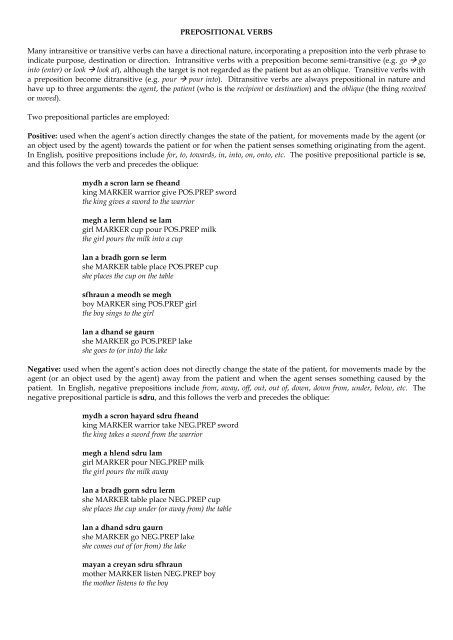You also want an ePaper? Increase the reach of your titles
YUMPU automatically turns print PDFs into web optimized ePapers that Google loves.
PREPOSITIONAL VERBS<br />
Many intransitive or transitive verbs can have a directional nature, incorporating a preposition into the verb phrase to<br />
indicate purpose, destination or direction. Intransitive verbs with a preposition become semi-transitive (e.g. go go<br />
into (enter) or look look at), although the target is not regarded as the patient but as an oblique. Transitive verbs with<br />
a preposition become ditransitive (e.g. pour pour into). Ditransitive verbs are always prepositional in nature and<br />
have up to three arguments: the agent, the patient (who is the recipient or destination) and the oblique (the thing received<br />
or moved).<br />
Two prepositional particles are employed:<br />
Positive: used when the agent’s action directly changes the state of the patient, for movements made by the agent (or<br />
an object used by the agent) towards the patient or for when the patient senses something originating from the agent.<br />
In English, positive prepositions include for, to, towards, in, into, on, onto, etc. The positive prepositional particle is se,<br />
and this follows the verb and precedes the oblique:<br />
mydh a scron larn se fheand<br />
king MARKER warrior give POS.PREP sword<br />
the king gives a sword to the warrior<br />
megh a lerm hlend se lam<br />
girl MARKER cup pour POS.PREP milk<br />
the girl pours the milk into a cup<br />
lan a bradh gorn se lerm<br />
she MARKER table place POS.PREP cup<br />
she places the cup on the table<br />
sfhraun a meodh se megh<br />
boy MARKER sing POS.PREP girl<br />
the boy sings to the girl<br />
lan a dhand se gaurn<br />
she MARKER go POS.PREP lake<br />
she goes to (or into) the lake<br />
Negative: used when the agent’s action does not directly change the state of the patient, for movements made by the<br />
agent (or an object used by the agent) away from the patient and when the agent senses something caused by the<br />
patient. In English, negative prepositions include from, away, off, out, out of, down, down from, under, below, etc. The<br />
negative prepositional particle is sdru, and this follows the verb and precedes the oblique:<br />
mydh a scron hayard sdru fheand<br />
king MARKER warrior take NEG.PREP sword<br />
the king takes a sword from the warrior<br />
megh a hlend sdru lam<br />
girl MARKER pour NEG.PREP milk<br />
the girl pours the milk away<br />
lan a bradh gorn sdru lerm<br />
she MARKER table place NEG.PREP cup<br />
she places the cup under (or away from) the table<br />
lan a dhand sdru gaurn<br />
she MARKER go NEG.PREP lake<br />
she comes out of (or from) the lake<br />
mayan a creyan sdru sfhraun<br />
mother MARKER listen NEG.PREP boy<br />
the mother listens to the boy


